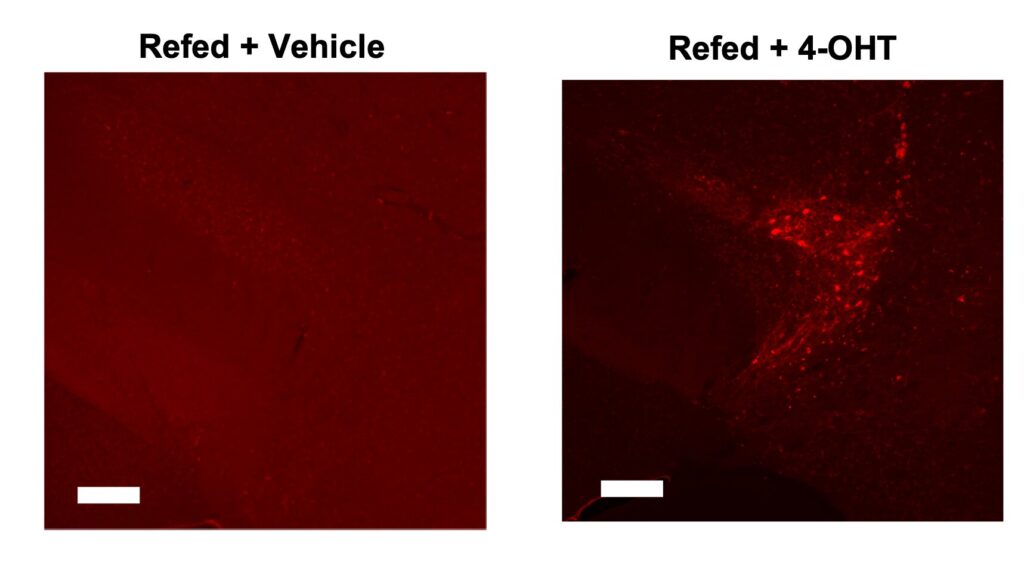
Subthalamic paraneurons (shown in red) that are sensitive to overeating reduce the mice’s motivation to start eating. Credit: The Scripps Research Institute
Do you grab your fork and take a bite of cake, or say “no” and walk away? Our motivation to eat is driven by a complex network of cells in our brain, which uses signals from within our body and sensory information about the food in front of us to determine our behavior.
Now, scientists at Scripps Research Institute have identified a group of neurons in a small, little-studied region of the brain, the parasubthalamic nucleus (PSTN), that control when an animal first decides to eat food.
In a study titled “Refeeding Population in the Subthalamic Nucleus Delays Feeding Onset and Speeds Fluid Intake,” published July 4, 2024 in the journal Molecular Psychiatry, the team set out to selectively manipulate a population of PSTN cells that become more active during periods of binge eating. Other scientists had observed that many PSTN cells become more active after a large meal, but the team wondered how these cells affect appetite.
“In our study, we used a technique that allows us to activate cells in the brains of mice that are activated by a specific experience, in this case overeating,” said Jeff Dunning, PhD, staff scientist at Scripps Research Institute and first author on the new paper. “Once we capture this population of PSTN cells, we can turn them on like a light switch and observe what happens to the animals’ eating and drinking.”
The team found that a population of cells sensitive to overeating could dramatically change the behavior of mice: Hungry mice typically start eating as soon as food is available. But when the researchers activated this population of PSTN cells, the mice started eating much slower and, surprisingly, started drinking water much faster.
“Our findings suggest that this particular population of PSTN cells drives early hunger-based decision-making before you actually eat,” Dunning said. “The effect on fluid intake may seem counterintuitive, but it may have something to do with thirst during meals, a phenomenon in which thirst is stimulated as soon as you start eating.”
By manipulating smaller groups of cells within the PSTN, the team was able to work out exactly which ones were responsible for delaying eating and accelerating drinking. They also discovered that another group of PSTN cells had a different effect, encouraging the mice to eat more of the sweet food.
“Collectively, these results reveal that PSTN neurons exert a complex combination of functions,” said senior author Candace Contet, PhD, associate professor in the Department of Molecular Medicine at Scripps Research.
“Several previous studies have shown that PSTN activity can limit food intake, but the fact that specific PSTN neurons control the initiation of eating and drinking, and promote the intake of a food ‘reward’, is entirely novel.”
Contet, Dunning and their colleagues think their findings may have implications for eating disorders in which people have too much or not enough control over the initiation of a meal — the decision to be satisfied with the first bite or to wait a little longer.
A similar mechanism may also be at work in the loss of control over the intake of other rewarding substances, such as drugs of abuse, a phenomenon the team is currently investigating.
Further information: Jeffery L. Dunning et al., “Refeeding population of hypothalamic nuclei delays feeding onset and promotes drinking,” Molecular Psychiatry (2024). DOI: 10.1038/s41380-024-02653-y
Courtesy of The Scripps Research Institute
Source: Scientists Identify Brain Cells That Delay the First Bite of Food (July 11, 2024) Retrieved July 11, 2024 from https://medicalxpress.com/news/2024-07-scientists-brain-cells-delay-food.html
This document is subject to copyright. It may not be reproduced without written permission, except for fair dealing for the purposes of personal study or research. The content is provided for informational purposes only.


